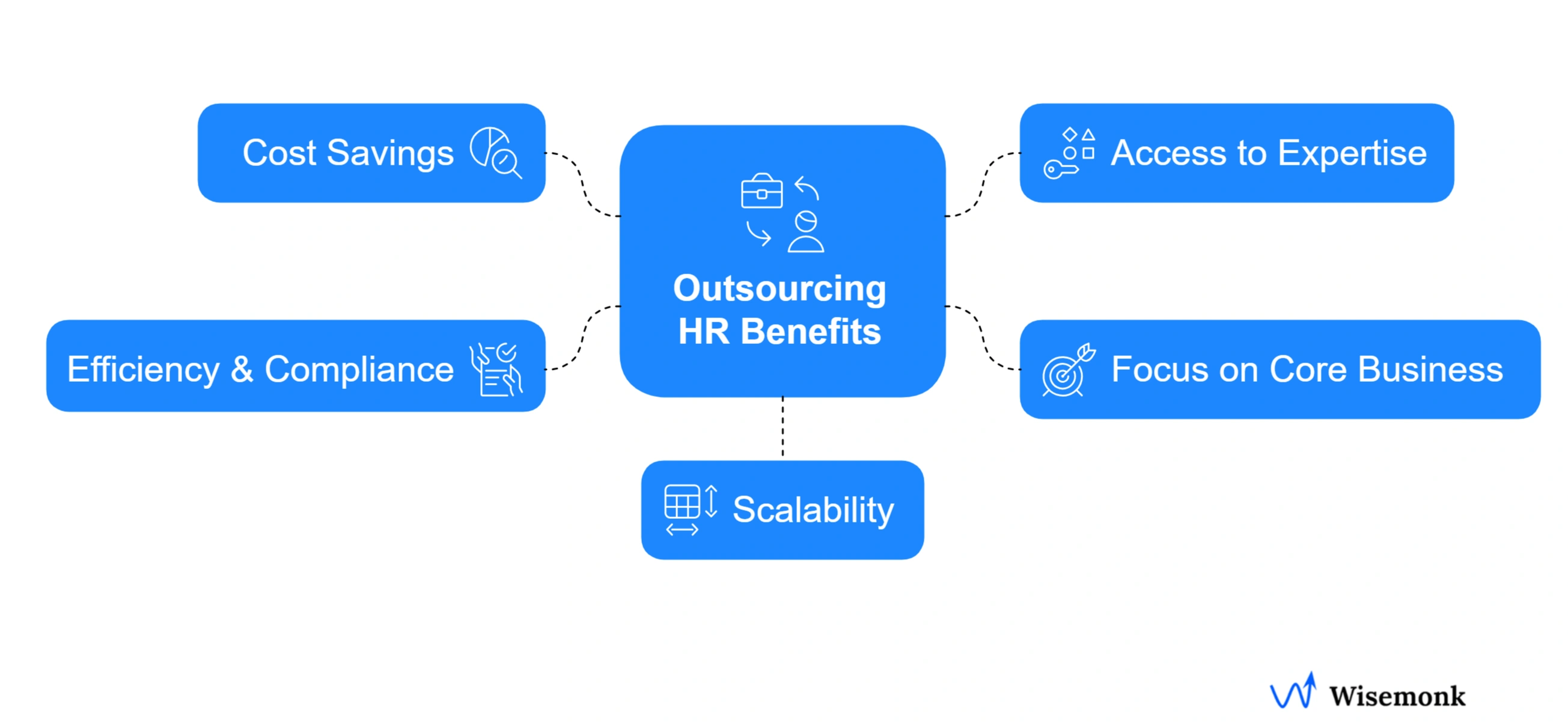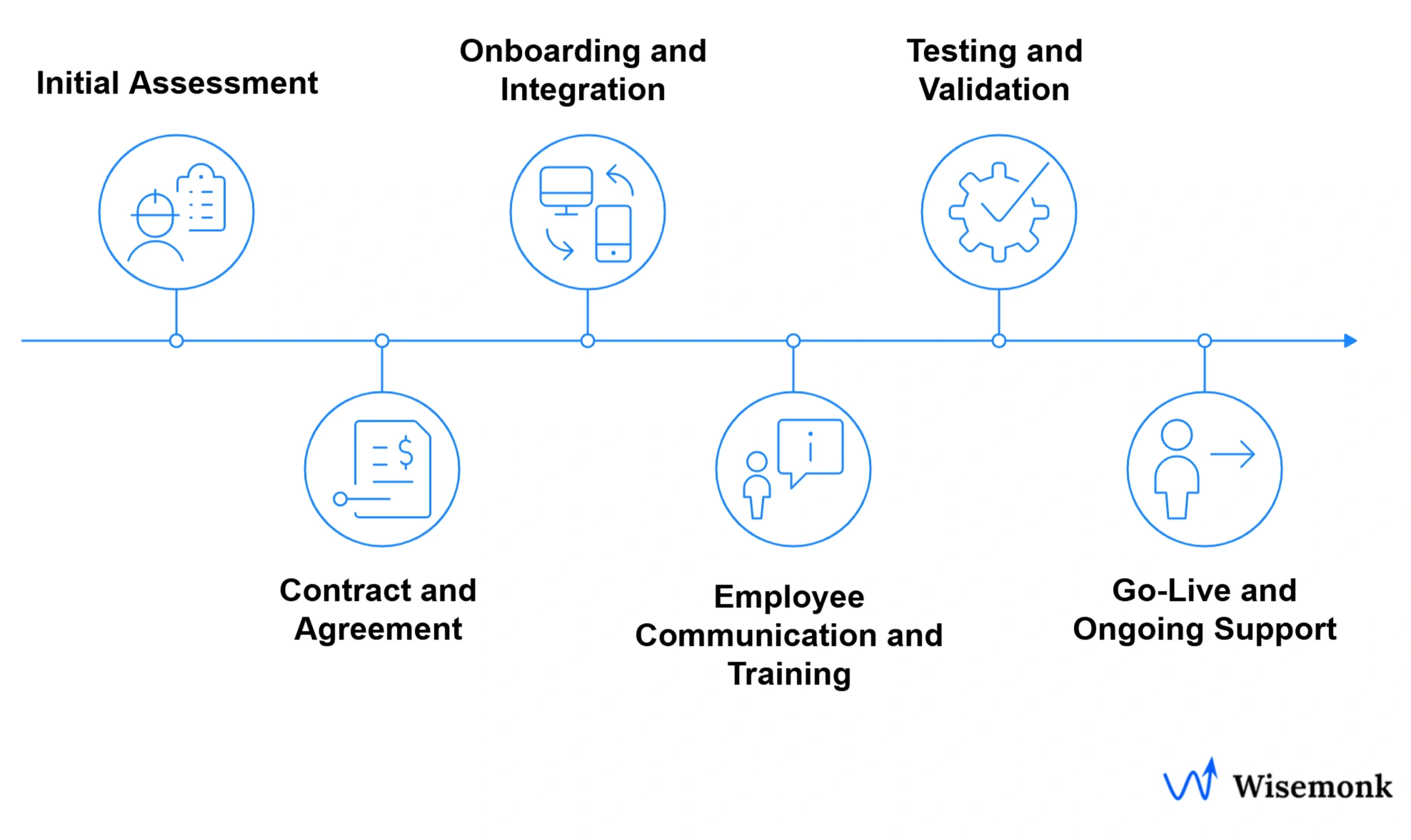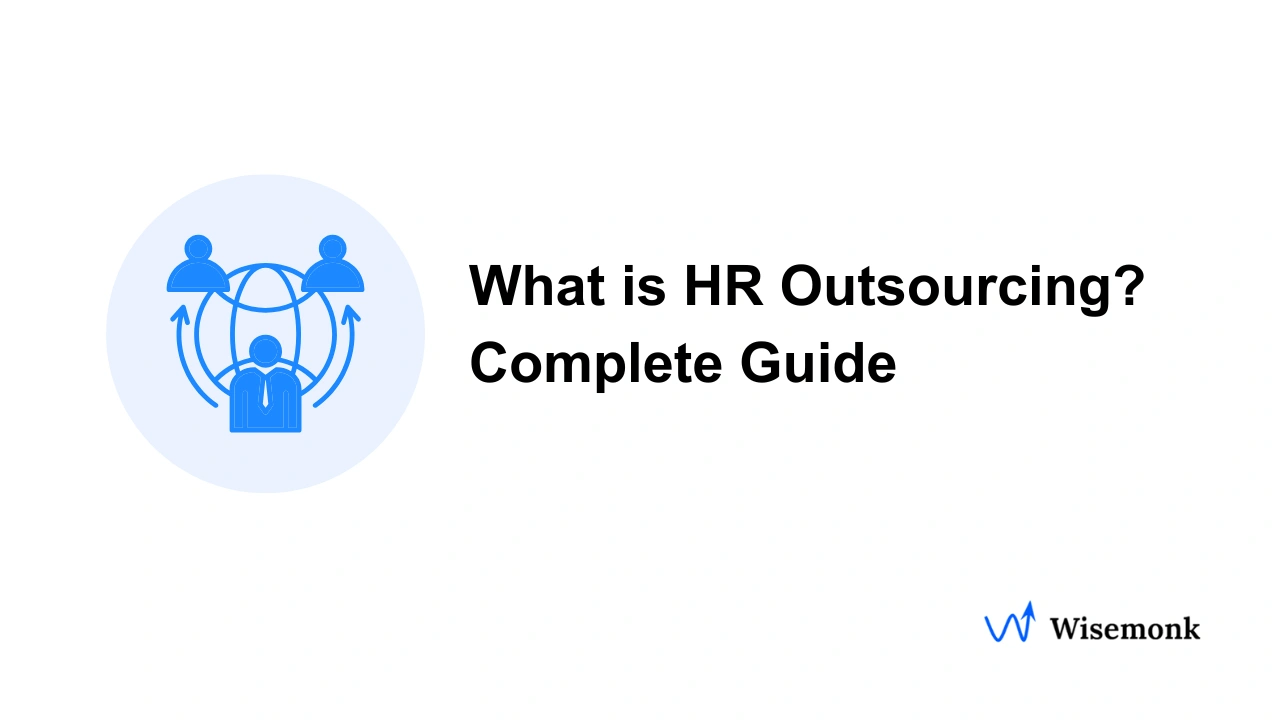- HR outsourcing means hiring an external provider to manage HR functions like payroll, compliance, and benefits to help companies save time, reduce costs, and stay compliant.
- Most HRO providers handle payroll, benefits administration, recruitment, onboarding, and compliance, while businesses keep strategic HR tasks like culture and leadership in-house.
- Outsourcing HR helps businesses achieve cost savings, gain specialized expertise, improve efficiency, and scale HR operations easily as they grow.
- The main HR outsourcing models are HRO, PEO, EOR, and ASO, each differing in legal employer status and liability; for global hiring, EOR works best, such as hiring in India with Wisemonk.
- To choose the right HRO partner, look for strong industry experience, transparent pricing, compliance expertise, scalable solutions, and global capabilities for seamless HR operations.
Need help with your global expansion? Contact us today!
Discover how Wisemonk delivers trusted international solutions.
Looking to understand what HR outsourcing really means and how it impacts growing businesses? HR outsourcing (HRO) refers to hiring a third-party provider to manage specific HR functions such as payroll processing, benefits administration, compliance, and employee relations. It’s becoming an essential strategy for small and mid-sized businesses that want to streamline HR operations, reduce overhead costs, and stay compliant with evolving employment laws and regulations. The HR outsourcing market is rapidly expanding, expected to grow from $51.7 billion in 2024 to $72.6 billion by 2030 worldwide.
In this guide, we’ll break down what HR outsourcing is, the key services it covers, how it works, and how to choose the right provider for your business.
What is HR outsourcing?[toc=What is HR Outsourcing]
HR outsourcing (HRO) is when a company hires an external provider to manage specific HR functions that would traditionally be handled by an in-house HR team. This can include tasks like payroll processing, benefits administration, compliance, and more. By outsourcing these HR tasks, businesses can streamline their operations, improve employee management, and ensure they stay compliant with evolving employment laws.
In our experience, we have seen that outsourcing HR functions allows companies to focus on their core business activities while leveraging the expertise of HR outsourcing providers to manage the complexities of human resources.
What services are provided by HRO companies?[toc=HRO Services]
HRO companies provide end-to-end HR services that help businesses manage day-to-day HR operations, from payroll processing to benefits administration and compliance.
Based on our experience supporting global and mid-sized businesses, we’ve seen that outsourcing HR functions gives companies access to specialized expertise, ensures regulatory compliance, and improves efficiency, especially when navigating complex employment laws and administrative tasks.
- Payroll Management: Handles employee wages, deductions, taxes, and filings to ensure accurate payroll administration and compliance with employment laws.
- Benefits Administration: Manages employee benefits such as health insurance and retirement plans to simplify benefits management and improve employee satisfaction.
- Recruitment: Sources, screens, and hires talent efficiently through specialized HR providers that streamline the process and reduce time-to-hire.
- Onboarding: Coordinates new employee setup, documentation, and training to ensure smooth employee integration and improved engagement from day one.
- Compliance: Keeps businesses aligned with local, state, and federal labor laws, reducing risk through ongoing regulatory compliance and risk management.
- Functions usually kept in-house: Most companies retain strategic HR functions like culture-building, leadership training, and workforce planning internally to align with business goals.
For more insights, see how Wisemonk simplifies payroll and HR management in India for global companies.
What are the benefits of outsourcing HR?[toc=HRO Benefits]
Outsourcing HR offers significant benefits, including cost savings, access to expertise, and improved efficiency in managing HR functions.
From what we’ve seen working with fast-growing and mid-sized businesses, the biggest payoff of outsourcing HR is balance; it reduces complexity while improving both efficiency and employee satisfaction.
Here are the benefits of HR outsourcing and how it helps businesses operate smarter:

- Cost Savings: Outsourcing HR functions reduces the expenses associated with maintaining an in-house HR team and infrastructure, leading to lower overhead costs.
- Access to Expertise: HR outsourcing providers bring specialized knowledge and resources in areas like payroll processing, benefits administration, and compliance, which might not be readily available internally.
- Focus on Core Business: By offloading administrative HR tasks, internal teams can concentrate on strategic business goals and core operations, driving business growth.
- Improved Efficiency & Compliance: Outsourcing streamlines HR processes, ensuring smoother operations, faster decision-making, and better adherence to evolving employment laws and regulations.
- Scalability: With outsourced HR services, businesses can easily scale their HR operations up or down based on changing needs, whether during growth or seasonal fluctuations.
Outsourcing HR allows businesses to improve employee management, enhance employee satisfaction, and mitigate the complexities of human resource outsourcing, leading to a more productive and compliant workforce.
What are the different HR outsourcing models?[toc=HRO Models]
HR outsourcing models include HRO, PEO, EOR, and ASO, each differing in who the legal employer is, liability, and scalability. Choosing the right model depends on whether your operations are domestic or global, and how much control you want to retain over HR management.
Why EOR matters for global hiring?
When hiring internationally, such as in India, an EOR acts as the legal employer, managing payroll, taxes, and employee benefits while ensuring full regulatory compliance. This allows companies to hire talent quickly and legally without setting up a local entity.
Quick takeaway: Use HRO/ASO to outsource HR tasks while staying the employer; choose PEO for a U.S. co-employment model; choose EOR when you must hire abroad fast and compliantly.
When does HR outsourcing make sense?[toc=When HRO Works]
HR outsourcing is a valuable solution when businesses face challenges like expanding into new states, managing benefits, ensuring compliance, or dealing with rapid hiring needs. In our experience, we’ve seen that outsourcing HR functions can help businesses scale efficiently while maintaining compliance with complex labor laws and improving overall employee management.
Here are some situations when HR outsourcing makes perfect sense:
- Expansion into Multiple States: As businesses expand into new states, they must navigate state-specific tax and labor laws. Outsourcing HR helps ensure compliance with varying regulations, reducing the risk of penalties or legal issues.
- First Benefits Program Rollout: When a company is rolling out its employee benefits program for the first time, outsourcing can provide the expertise to set up competitive plans, manage enrollments, and ensure compliance with benefits administration.
- Compliance Gaps: With constantly evolving employment laws, outsourcing HR helps companies stay up-to-date with changing regulations. It reduces the risk of non-compliance by ensuring HR processes are regularly reviewed and aligned with the latest requirements.
- Hiring Spikes: During periods of rapid growth or hiring spikes, outsourcing HR can streamline recruitment and onboarding, helping businesses efficiently scale their teams while avoiding delays or bottlenecks in the hiring process.
Outsourcing HR functions in these situations allows companies to focus on business growth while experts handle the complexities of HR operations and compliance.
How much does HR outsourcing cost?[toc=HRO Costs]
The cost of HR outsourcing depends on several factors, including the services provided, the size of your workforce, and whether you choose a PEO, EOR, or HRO model.
Generally, the cost can be broken down into the following categories:
- PEPM (Per Employee Per Month): Most HR outsourcing providers charge on a PEPM basis. The typical range is $50–$200 per employee per month, depending on the services included. This can vary based on the complexity of services like payroll processing, benefits administration, and compliance support.
- Percentage of Payroll: Some providers charge a percentage of payroll—typically 2–6%. This model is often used by PEOs and some EORs and scales with the size of your payroll.
- Onboarding and Add-On Costs: In addition to PEPM or percentage-based fees, there may be one-time costs for onboarding, such as background checks, benefits administration setup, and other customized services. These costs are usually charged as add-ons to the base service fees.
Tip: Comparing the cost-benefit of outsourcing HR versus maintaining an in-house HR team often reveals that outsourcing can be more cost-effective. In-house HR teams require salaries, benefits, training, software tools, and legal compliance resources, which can add up quickly, especially for growing businesses. Outsourcing HR often results in lower operational costs, with the added benefit of specialized expertise.
In-house HR vs outsourced HR: Which works better?[toc=In-house vs. HRO]
Choosing between an in-house HR team and outsourced HR services depends on your business’s needs, growth stage, and the level of control you want over HR functions. Here’s a comparison of the two models based on flexibility, control, scalability, and expertise:
In-House HR gives businesses full control over HR operations and ensures alignment with company culture. However, it requires more resources and can be difficult to scale. Outsourced HR offers specialized expertise and scalability, but you may have less control over day-to-day HR tasks.
Suggested Hybrid Model: For many businesses, a hybrid model works best: keep strategic HR functions (e.g., leadership training, culture-building) in-house, while outsourcing administrative HR tasks (like payroll, benefits, and compliance) to an HR provider. This allows you to retain control over employee relations and company culture while leveraging outsourced expertise to handle the complexities of HR management.
This approach offers the best of both worlds, ensuring your business runs efficiently while maintaining flexibility and expertise.
How to choose an HRO partner?[toc=How to Choose]
Choosing the right HR outsourcing provider is a critical decision that impacts the efficiency, compliance, and scalability of your HR operations.
Here’s a 10-point checklist to guide your evaluation process:
- Industry Experience: Choose a provider with proven experience in your industry. They should understand your sector’s unique HR challenges and regulatory requirements.
- Scalability: Ensure the provider can adapt and scale their services as your business grows or enters new markets.
- Service and Support: Assess the responsiveness and quality of customer support, including availability of dedicated account managers.
- Transparent Pricing: Look for clear and itemized pricing models without hidden fees to ensure transparency.
- Compliance and Security: Verify their commitment to regulatory compliance and data security, including SOC 2 certification to safeguard employee data.
- Technology Integration: Ensure they offer compatible HR software or can seamlessly integrate with your existing HR systems.
- Global Capabilities: If you plan to expand internationally, confirm that the provider offers EOR or cross-border HR support.
- Reputation and Reviews: Research client testimonials, reviews, and case studies to assess the provider’s credibility and performance.
- Implementation Process: Ask for a detailed implementation timeline to ensure smooth transition and onboarding.
- Contingency and Exit Strategies: Ensure that the provider has contingency plans and a clear process for transitioning or exiting the partnership, if necessary.
This checklist will help ensure that the HR outsourcing partner you choose is well-equipped to handle your needs, whether you're managing HR administration or expanding internationally.
For businesses planning to hire in India, you can explore Wisemonk’s EOR onboarding checklist to see how a compliant, structured approach simplifies cross-border hiring.
What does the HR outsourcing implementation process look like?[toc=Implementation]
The HR outsourcing implementation process involves several key steps to ensure a smooth transition from in-house HR management to outsourced services. Here’s a brief overview:

- Initial Assessment: The HRO provider evaluates your business’s HR needs, including the scope of services, compliance requirements, and existing HR infrastructure.
- Contract and Agreement: Once you agree on services, the provider drafts a contract outlining deliverables, timelines, and pricing.
- Onboarding and Integration: The provider integrates their systems with your current HR software, aligning with your existing processes. This includes setting up payroll systems, benefits management, and data security measures.
- Employee Communication and Training: Clear communication is key, employees are informed about changes, and necessary training on new HR systems is provided.
- Testing and Validation: A testing phase ensures everything runs smoothly, with the provider conducting checks on payroll processing, benefits enrollment, and compliance protocols.
- Go-Live and Ongoing Support: After successful testing, the system goes live, and the provider continues to offer ongoing support and monitoring to address any issues that arise.
This process ensures a seamless transition and that your outsourced HR services are fully integrated into your operations, allowing you to focus on growth and strategic initiatives.
How Wisemonk helps global teams scale HR?[toc=How Wisemonk Helps]
Wisemonk is a leading Employer of Record (EOR), enabling global companies to hire, pay, and manage employees without the need to set up a local entity. We simplify the complexities of global hiring, compliance, and payroll, making it easy to expand into India.
Here’s how we help businesses scale HR:
- We become your legal employer in India and handle employment contracts, payroll, and compliance with local labor laws like PF, ESI, and gratuity.
- We streamline the process with a single contract that covers everything including hiring, onboarding, and ongoing employee management.
- We handle compliant onboarding for new hires in India and ensure they are set up quickly with everything they need, from laptops to IT setups.
- We take care of employee benefits like health insurance and retirement plans, ensuring they comply with Indian labor norms, and we also manage tax filings, including income tax and professional tax.
- Our HR experts manage day-to-day HR tasks, ensuring employee satisfaction and smooth operations.
While India is our core strength, we understand that many businesses have global ambitions. That’s why we also support clients expanding into key markets like the United Kingdom, the United States and beyond. With Wisemonk, you get a reliable partner for your India operations and your broader global hiring journey.
Ready to expand your global team? Talk to our team today.
Frequently asked questions
What is HR outsourcing in simple words?
HR outsourcing involves hiring an external company to handle specific HR tasks such as payroll, recruitment, benefits administration, and compliance, instead of handling them internally. It helps businesses focus on core operations while ensuring HR functions run smoothly.
What does outsourced HR do?
Outsourced HR takes over day-to-day HR activities, including managing payroll, benefits, employee relations, and compliance with labor laws, helping businesses reduce administrative burden and focus on their strategic goals.
What is the difference between HR consulting and HR outsourcing?
HR consulting offers strategic advice and guidance on HR issues, while HR outsourcing involves transferring specific HR functions to an external provider who handles those tasks on behalf of the business.
Is HR outsourcing the same as a PEO?
No, HR outsourcing means retaining full employer responsibility while outsourcing certain HR tasks. A PEO (Professional Employer Organization) involves co-employment, where both the business and PEO share responsibilities for HR functions like payroll and benefits.
Can I outsource just payroll or benefits?
Yes, businesses can choose to outsource specific HR functions such as payroll or benefits administration, while keeping other tasks like recruitment or employee relations in-house.
What’s the difference between ASO and HRO?
An ASO (Administrative Services Organization) provides administrative support without assuming the legal employer role, while an HRO (Human Resource Outsourcing) provider manages a wider range of HR functions and may take on legal employer responsibilities.
How much does HRO typically cost?
The cost of HR outsourcing (HRO) usually depends on company size, scope of services, and location. Most providers charge between $50–$200 per employee per month (PEPM) or 2–6% of total payroll. Some may also include one-time setup or onboarding fees for services like benefits administration or payroll integration.

%20(1).webp)
%20(1).webp)
%20(1).webp)